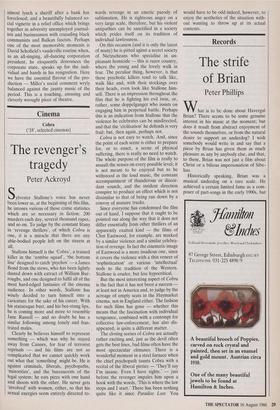Cinema
Cobra ('18', selected cinemas)
The revenger's tragedy
Peter Ackroyd
Sylvester Stallone's voice has never been lower as, at the beginning of this film, he intones various of those crime statistics which are so necessary in fiction: 200 murders each day, several thousand rapes, and so on. To judge by the constant litany in 'revenge thrillers', of which Cobra is one, it is a miracle that there are any able-bodied people left on the streets at all.
Stallone himself is the 'Cobra', a' trained killer in the 'zombie squad', 'the bottom line' designed to catch 'psychos' — a James Bond from the stews, who has been lightly dusted down with extract of William Bur- roughs, and one designed to fulfil all of the most hard-edged fantasies of the cinema audience. In other words, Stallone has wisely decided to turn himself into a caricature for the sake of his career. With his statuesque bust, and his bee-stung lips, he is coming more and more to resemble• Jane Russell — and no doubt he has a similar following among lonely and frus- trated males.
Clearly he believes himself to represent something — which was why he stayed away from Cannes, for fear of terrorist reprisals — and his films are not so complicated that we cannot quickly work out what that 'something' might be. He is against criminals, liberals, psychopaths, 'minorities', and the bureaucrats of the legal system; he eats pizza with one hand and shoots with the other. He never gets 'involved' with women, either, so that his sexual energies seem entirely directed to- wards revenge in an emetic parody of sublimation. He is righteous anger on a very large scale, therefore, but his violent antipathies can be sanctified in a society which prides itself on its tradition of individual lawlessness.
On this occasion (and it is only the latest of many) he is pitted aginst a secret society of Nietzscheans who specialise in un- pleasant homicide — this is razor country, where the young and the lovely walk in fear. The peculiar thing, however, is that these psychotic killers tend to talk like, walk like and, with their stockings over their heads, even look like Stallone him- self. There is an impression throughout the film that he is fighting his evil twin, or, rather, some doppelganger who insists on engaging him in perpetual battle. Perhaps this is an indication from Stallone that the violence he celebrates can be misdirected, and that the 'civilisation' he defends is very frail; but, then again, perhaps not.
Cobra is not easy to watch. And, since the point of each scene is either to prepare for, or to enact, a scene of physical suffering, there is really no need to watch. The whole purpose of the film is really to assault the senses on every possible level; it is not meant to be enjoyed but to be withstood as the loud music, the constant accompaniment of thunderous or discor- dant sounds, and the strident direction conspire to produce an effect which is not dissimilar to that of being run down by a convoy of manure trucks. Since everyone has condemned the film out of hand, I suppose that it ought to be pointed out along the way that it does not differ essentially from other thrillers of an apparently exalted kind — the films of Clint Eastwood, for example, are marked by a similar violence and a similar celebra- tion of revenge. In fact the cinematic image of Eastwood is a more insidious one, since it covers the violence with a thin veneer of 'sophistication' or various 'intellectual' nods to the tradition of the Western. Stallone is cruder, but less hypocritical.
But the most interesting aspect of Cobra is the fact that it has not been a success — at least not in America and, to judge by the acreage of empty seats in the Haymarket cinema, not in England either. The fashion for such films has gone — whether this means that the fascination with individual vengeance, combined with a contempt for collective law-enforcement, has also dis- appeared, is quite a different matter.
The closing scenes of Cobra are actually rather exciting and, just as the devil often gets the best lines, bad films often have the most spectacular climaxes. There is a wonderful moment in a steel furnace when the chief psychopath taunts Cobra with a recital of the liberal pieties — 'They'll say I'm insane. Even I have rights.' — just before the revenger impales him upon a hook with the words, `This is where the law stops and I start.' There has been nothing quite like it since Paradise Lost. You would have to be odd indeed, however, to enjoy the aesthetics of the situation with- out wanting to throw up at its actual contents.










































 Previous page
Previous page